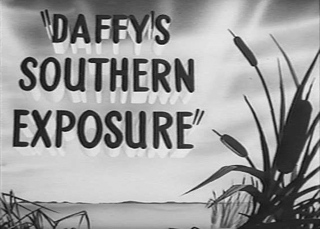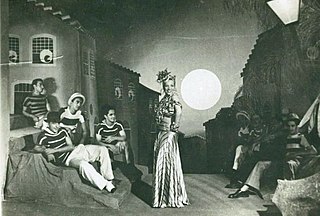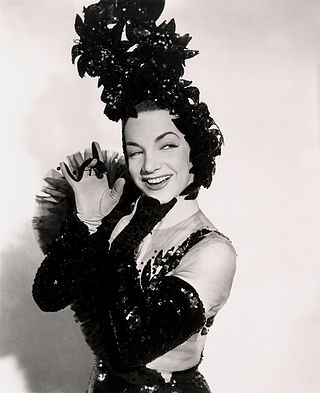
Maria do Carmo Miranda da Cunha, known professionally as Carmen Miranda, was a Portuguese-born Brazilian singer, dancer, and actress. Nicknamed "The Brazilian Bombshell", she was known for her signature fruit hat outfit that she wore in her American films.

Ary Evangelista de Resende Barroso was a Brazilian composer, pianist, soccer commentator, and talent-show host on radio and TV. He was one of Brazil's most successful songwriters in the first half of the 20th century. Barroso also composed many songs for Carmen Miranda during her career.

The Gang's All Here is a 1943 American Twentieth Century Fox Technicolor musical film starring Alice Faye, Carmen Miranda and James Ellison. The film, directed and choreographed by Busby Berkeley, is known for its use of musical numbers with fruit hats. Included among the 10 highest-grossing films of that year, it was at that time Fox's most expensive production.
"South of the Border Down Mexico Way" is a popular song describing a trip to Mexico, written by Jimmy Kennedy and Michael Carr. It was originally released in 1939, with many versions following, including one for the film of the same name sung by star Gene Autry.

Down Argentine Way is a 1940 American musical film made in Technicolor by Twentieth Century Fox. It made a star of Betty Grable in her first leading role for the studio although she had already appeared in 31 films, and it introduced American audiences to Carmen Miranda. It also starred Don Ameche, The Nicholas Brothers, Charlotte Greenwood, and J. Carrol Naish.

Copacabana is a 1947 American musical comedy film directed by Alfred E. Green starring Carmen Miranda, Groucho Marx and Steve Cochran. The film is a showcase for Miranda, who performs several numbers in her usual style, including a high-energy rendition of "Tico-Tico". Groucho, as Lionel, her fiance and agent, also sings a musical number, "Go West, Young Man", wearing his traditional greasepaint brows, mustache, and baggy suit. This was Groucho's first significant film appearance as a solo act, minus Harpo and Chico.

That Night in Rio is a 1941 American Technicolor musical comedy film directed by Irving Cummings and starring Alice Faye, Don Ameche and Carmen Miranda. It was produced and distributed by Hollywood Twentieth Century Fox. It is one of several film adaptations of the 1934 play The Red Cat by Rudolf Lothar and Hans Adler. Others are Folies Bergère de Paris (1935) and On the Riviera (1951).

Doll Face is a 1945 American film released by 20th Century Fox and directed by Lewis Seiler starring Vivian Blaine as "Doll Face" Carroll. It also stars actor Dennis O'Keefe and singers Carmen Miranda and Perry Como. The film is based on the 1943 play The Naked Genius written by Gypsy Rose Lee. In the opening credits, she is billed under her birth name, Louise Hovick. The film is also known as Come Back to Me in the United Kingdom.

Daffy's Southern Exposure is a 1942 Warner Bros. Looney Tunes animated short directed by Norman McCabe. The cartoon was released on May 2, 1942, and stars Daffy Duck.
"Na Baixa do Sapateiro" is a famous Brazilian song, written by Ary Barroso. Its title comes from a street in Salvador, Bahia, where many cobblers once worked. It was originally released in 1938 as the B side to Salada Mista, which did not achieve the same level of success. This first recording was sung by Carmen Miranda with Orchestra Odeon. She never released the song on disc in the United States. The song was originally going to be featured in the Carmen Miranda film Banana da Terra (1939), but was replaced with "O Que É Que A Baiana Tem?", because of the high license fee demanded by Ary Barroso to use his song. However the song has been recorded many other times by a large number of artists. The song gained international fame when it was featured in the Disney film The Three Caballeros (1944).

Carmen Miranda: Bananas is My Business is a 1995 documentary filmed and directed by Helena Solberg. This documentary chronicles the life and career of Carmen Miranda, Hollywood's symbol of Latin American spirit in the 1940s. The documentary tells her life story in a series of stages, beginning with her roots and rise to stardom in her home country of Brazil, her transition and development as a performer in the United States, first on Broadway in New York City, then in the film industry after she signed with 20th Century Fox in Los Angeles, and her later years in life, before her death and her return to Brazil. Helena Solberg uses two different film styles, biography and directorial reverie, in which Solberg uses actor Erick Barretos to “resurrect Carmen Miranda in several fantasy sequences. Helena Solberg's attitudes shift throughout the documentary from awe-struck child to empathetic and forgiving Brazilian woman, which she uses to represent the contradictory subplots of Carmen Miranda's life. Alongside the fantasy like resurrection of Miranda, Solberg accompanies her documentary with multiple interviews with Carmen Miranda's friends and family, like her sister, her first boyfriend, the guitarist Laurindo Almeida, samba song-writer Synval Silva, Cesar Romero, and Alice Faye.

Carmen Miranda Museum, located in the Parque Brigadeiro Eduardo Gomes, is a museum established in homage to singer and actress Carmen Miranda and open to the public since 1976. The museum was officially opened on the 21st anniversary of her death.
Helena Solberg is a Brazilian-born documentarist who, since 1971, has made her career in the United States. She is recognized as the only woman to participate in "Cinema Novo" movement in Brazil.

O que é que a baiana tem? is a song composed by Dorival Caymmi in 1939 and recorded by Carmen Miranda.
"Mamãe eu quero" is a 1937 Brazilian song composed by Vicente Paiva and Jararaca, and is one of the most famous Brazilian songs. The original recording was made by one of the composers, Jararaca, in 1937 and recorded on Odeon Records.

Banana da Terra is a 1939 Brazilian musical film directed by Ruy Costa and written by Braguinha and Mário Lago. The film stars Carmen Miranda, Dircinha Batista, and Aloysio de Oliveira. It was Miranda's last film in Brazil, before she moved to Hollywood.

"No Tabuleiro da Baiana" is a samba written in 1936 by Ary Barroso and recorded by Carmen Miranda.

Aloísio or Aloysio de Oliveira, also known as Louis Oliveira, was a Brazilian record producer, singer, actor and composer. A key figure in the internationalization of Brazilian popular music, he contributed to Carmen Miranda's career abroad with his own musical ensemble: Bando da Lua, which he founded in 1929 with Hélio Jordão Pereira, Afonso Osório, Stênio Osório, Armando Osório, Osvaldo Éboli, Ivo Astolfi, Diego Astolfi and some other cousins of the latter for a total of 12 people. With the death of Miranda in August 1955 the group disbanded. Back in Brazil, Aloísio directed the command of Odeon Records, then created his own record label: the Elenco, producing dozens of discs and launching important names of bossa nova as Tom Jobim.

José do Patrocínio Oliveira, known by the pseudonym Zé Carioca, was a Brazilian musician and voice actor.

This is a complete filmography of Carmen Miranda, a Portuguese-Brazilian singer, actress, and dancer.
















